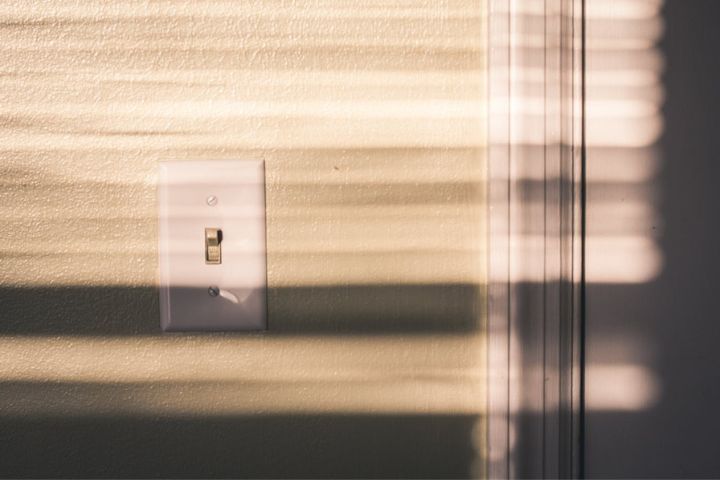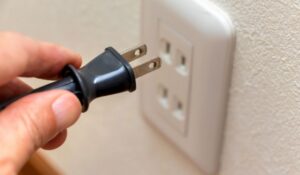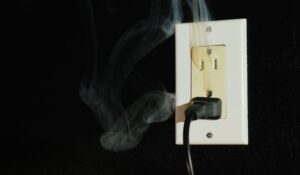Have you ever flipped a light switch only to be greeted by an unexpected buzzing noise? It’s a common occurrence in many households and businesses that can be quite perplexing. Not only is it annoying, but it might also raise concerns about safety and potential electrical issues.
Fear not, as we’re here to shed some light on the matter (pun intended!) and help you understand what causes that mysterious buzzing sound and how you can address it.
Light switches can buzz due to loose connections, faulty wiring, or incompatible dimmer switches, which create vibrations as electricity flows through them. To address the issue, turn off the power to the switch and tighten any loose connections. If the buzzing persists, consider consulting a qualified electrician.
Why is my light switch buzzing? Potential causes
So, what causes a light switch to buzz? Before diving into solutions, let’s explore why light switches sometimes buzz. The buzzing sound typically originates from the switch itself or the electrical connections associated with it. Here are some common culprits:
Loose Connections: Over time, the electrical connections inside a switch can become loose due to regular use or poor installation. When electricity flows through these loose connections, it can cause vibrations, resulting in a buzzing noise.
Faulty Wiring: If the wiring connected to the switch is faulty or damaged, it can create resistance in the electrical circuit, leading to buzzing sounds. Faulty wiring is a serious issue that should be addressed promptly to prevent potential safety hazards like electrical fires.
Dimmer Switches: Dimmer switches are known for causing buzzing noises, especially when they’re not compatible with the type of light bulbs being used. The buzzing may occur due to the way dimmer switches regulate the flow of electricity to adjust the brightness of the lights.
Voltage Fluctuations: In some cases, buzzing may be a result of voltage fluctuations in the electrical system. This can happen due to various factors such as overloaded circuits, faulty appliances, or issues with the power supply.
On or off: does it matter?
Light switch makes buzzing sound when turned off
If your light switch buzzes when it’s turned off, it could indicate a few potential issues. One possibility is that there’s a loose connection within the switch or the electrical wiring, causing electricity to arc across the gap and produce the buzzing noise.
It could also be a sign of faulty wiring or a defective switch. In any case, it’s essential to investigate the issue further to ensure the safety of your electrical system and address any underlying problems promptly. Consulting with a qualified electrician is recommended to diagnose and resolve the issue safely.
Light switch buzzing when turned on
If your light switch buzzes when it’s turned on, it suggests that there may be an issue with the switch itself or the electrical connections associated with it. This buzzing could be caused by loose connections, faulty wiring, or incompatible dimmer switches.
It’s important to address this issue promptly to prevent potential safety hazards and ensure the proper functioning of your lighting system. Consulting with a qualified electrician can help diagnose the problem and implement the necessary repairs or replacements.
Is a buzzing light switch dangerous?
A buzzing light switch can potentially indicate underlying electrical issues that may pose safety hazards if left unaddressed. While not all instances of buzzing switches are immediately dangerous, they could signify problems such as loose connections, faulty wiring, or overloaded circuits, which can lead to electrical fires or shocks.
Therefore, it’s crucial to investigate the cause of the buzzing and take appropriate action to rectify any issues. A buzzing light switch is a good sign to call an electrician.
Can a buzzing light switch cause a fire?
A buzzing light switch itself is not likely to directly cause a fire. However, the buzzing may indicate underlying electrical problems such as loose connections, flickering lights, faulty wiring, or overloaded circuits, which can increase the risk of electrical fires if left unaddressed.
Over time, the heat generated by these electrical issues could potentially ignite surrounding materials, leading to a fire hazard. Therefore, it’s crucial to investigate and resolve the cause of the buzzing to mitigate the risk of fire and ensure the safety of your home.
How to fix a buzzing light switch
Now that we’ve identified some potential causes, let’s explore how you can troubleshoot and resolve the buzzing issue:
Tighten Electrical Connections: Start by turning off the power to the affected light switch at the circuit breaker. Carefully remove the switch cover plate and tighten the screws holding the switch in place. Ensure that all electrical connections are secure and free of any debris.
Inspect Wiring: If tightening connections doesn’t solve the problem, inspect the wiring connected to the switch for any signs of damage or wear. If you’re not comfortable working with electrical wiring, it’s best to seek the assistance of a qualified electrician to diagnose and fix the issue safely.
Upgrade Dimmer Switch: If the buzzing is coming from a dimmer switch, consider replacing it with a newer model that is compatible with the type of light bulbs you’re using. LED bulbs, for example, often require dimmer switches specifically designed for them to avoid buzzing and flickering.
Stabilize Voltage: Address any underlying issues causing voltage fluctuations in your electrical system. This may involve consulting with a professional electrician to assess your home’s wiring, upgrade outdated electrical panels, or redistribute electrical loads to prevent overloading circuits.
When to replace your buzzing light switch
Dealing with a buzzing light switch can be frustrating, but it’s important to determine whether a simple fix will suffice or if a replacement is necessary. When in doubt, replacing the switch is a good electrical preventative maintenance step that can save you from big headaches going forward.
Here are some factors to consider when deciding whether to replace a buzzing light switch:
Persistent Buzzing: If the buzzing persists even after tightening connections and addressing potential wiring issues, it may be a sign of a more serious problem. In such cases, replacing the switch might be the most effective solution to eliminate the noise and ensure the safety of your electrical system.
Visible Damage: Inspect the light switch for any visible signs of damage, such as cracks, discoloration, or melting. Damaged switches pose a significant safety risk and should be replaced immediately to prevent electrical hazards.
Age of the Switch: Like any other household component, light switches have a lifespan and may deteriorate over time. If your switch is old or showing signs of wear, replacing it with a new one can provide peace of mind and eliminate potential issues like buzzing or malfunctioning.
Safety Concerns: If you suspect that the buzzing is caused by underlying electrical problems or if you’re unsure about the safety of the switch, err on the side of caution and replace it promptly. Electrical safety should always be a top priority to protect your home and family from hazards like electrical fires.
Compatibility Issues: In some cases, buzzing may occur due to compatibility issues between the switch and the light bulbs or fixtures being used. If you’ve recently installed new bulbs or fixtures and noticed an increase in buzzing, consider replacing the switch with one that is compatible with your lighting setup.
Ultimately, the decision to replace a buzzing light switch will depend on the severity of the issue, the condition of the switch, and your comfort level with troubleshooting electrical problems.
If you’re unsure or hesitant about replacing the switch yourself, don’t hesitate to seek assistance from a qualified electrician who can assess the situation and provide expert guidance. Investing in a new, properly functioning light switch is a small price to pay for the safety and convenience it brings to your home.









